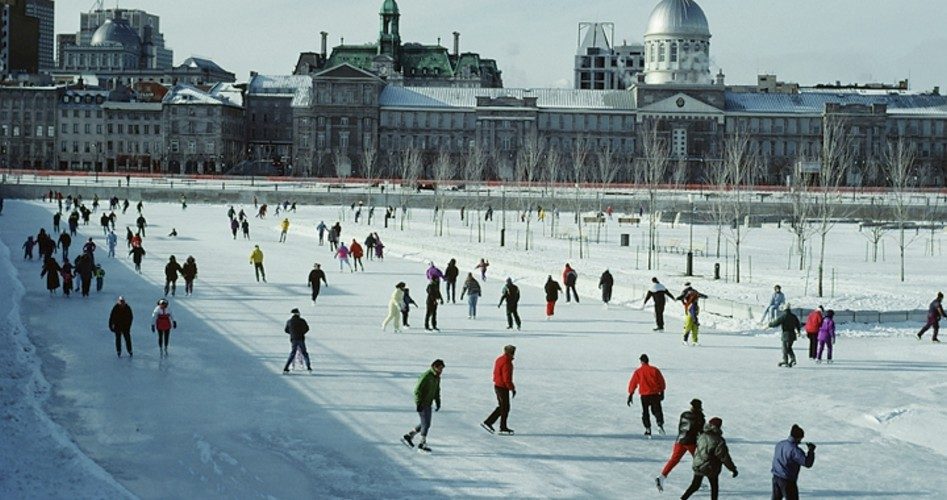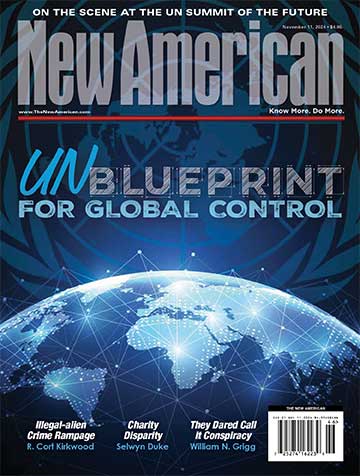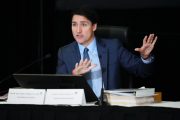
Commentators and officials said Wednesday that the United Nations had cemented its position as a discredited global laughing stock after the UN “Food Envoy” criticized Canada — one of the wealthiest and healthiest nations in the world — for alleged inequality, poverty, and obesity. Critics of the global body and top Canadian policy makers promptly lambasted the organization for wasting scarce taxpayer resources “investigating” the nation and demanding reforms even as millions of people around the world starve.
UN “Special Rapporteur on the Right to Food” Olivier De Schutter presented his demands for Canada in a dubious report released Wednesday after completing an 11-day so-called “fact-finding” mission. The controversial bureaucrat insisted the situation in the wealthy northern nation was “unacceptable,” saying officials must immediately develop what he called a “national right-to-food strategy.” De Schutter also claimed Canada needed a larger welfare state, more taxes, and a higher minimum wage.
“My concerns are extremely severe,” the UN food boss concluded at a press conference in Ottawa, demanding that politicians raise taxes to adopt new government schemes to battle obesity and other alleged social ills. “What I’ve seen in Canada is a system that presents barriers for the poor to access nutritious diets and that tolerates increased inequalities between rich and poor, and aboriginal and non-aboriginal peoples.”
Canadian officials, of course, were not amused. Immigration Minister Jason Kenney, for example, blasted the UN’s grandstanding in one of the fiercest criticisms of the report, saying De Schutter’s mission to Canada was “completely ridiculous” political theater, a waste of time, and “a discredit” to the global body.
“Canada sends billions of dollars of food aid to developing countries around the world where people are starving,” Kenney explained, pointing out that his country ranks near the top of the UN’s own “social development” index. “It would be our hope that the contributions we make to the United Nations are used to help starving people in developing countries, not to give lectures to wealthy and developed countries like Canada.”
Canadian Foreign Minister John Baird also dismissed the findings, saying local officials were working to improve the lives of Canadians. “There are, what, 193 members of the UN? I think most Canadians would think that spending 11 days in Canada on this issue — his time would be better spent elsewhere,” Baird told reporters.
De Schutter, meanwhile, also complained that some Canadians — close to 900,000 last year out of a population of 34 million, he claimed — had accessed food banks. “These rates of food insecurity are unacceptable, and it is time for Canada to adopt a national right-to-food strategy,” the UN food boss demanded, blasting the fact that people sometimes relied on charity instead of government handouts. “This is a country that is rich but that fails to adapt the levels of social assistance benefits and its minimum wage to the rising costs of basic necessities, including food and housing.”
Meanwhile, there are too many fat people in Canada for the global body’s taste, bemoaned the chief UN “right-to-food” bureaucrat, alleging that around one-fourth of Canadian adults were “obese” and that it was making the workforce less productive. According to his report, the government should do more to influence what Canadians eat, as well as taking further steps to control advertising.
Finally, De Schutter lamented, aboriginal people need more government assistance so they can eat properly. “A long history of political and economic marginalization has left many indigenous peoples with considerably lower levels of access to adequate food relative to the general population,” he wrote in his report.
Canada’s Health Minister Leona Aglukkaq quickly dismissed the UN’s criticism in what news reports said was a “rare outburst” for the senior official, calling De Schutter an “ill informed, patronizing academic.” And ironically, the global body’s incessant drive to impose extreme “environmental” regimes on the planet is actually contributing to the hardships faced by aboriginal people.
De Schutter “does not understand that they continue to live off the land, even today,” Aglukkaq explained, pointing out that she met with the UN official to educate him about Canada. And pressure from environmentalist and animal-rights “activists” to further restrict hunting and fishing — not to mention UN “sustainability” schemes — is actually making it harder for natives to access the food they need.
The global food chief also drew fire for his apparent obliviousness to the Canadian system of constitutional government, which reserves most coercive powers to provincial authorities instead of federal officials. “In the course of the visit it has become clear to the Special Rapporteur that Canada is in need of a national right to food strategy,” De Schutter insisted in the report, among a range of other controversial proposals that would also violate the Constitution.
He touted the alleged benefits of central planning as well, claiming that “national strategies allow governments to do long-term planning on food issues.” The regimes ruling over North Korea and Cuba, for instance, both have “national food strategies.” They are also two of the poorest nations on earth — and most people barely get enough food to survive.
But while the food chief advocated central government planning and production “targets” to ensure “food security” in Canada — though such policies have consistently resulted in mass starvation and death everywhere they have been attempted — he lamented the emergence of non-governmental systems to deal with problems. “The failures of social assistance levels to meet the basic needs of households, have resulted in the proliferation of private and charity-based food supplements,” he complained in his report. It was not immediately clear what De Schutter’s problem with charity was.
On top of that, the global body’s food bureaucrat said, Canadian officials are not doing nearly enough to impose and enforce highly controversial UN demands on citizens. “The Special Rapporteur is also concerned by the worrying trend of Canada’s lack of implementation of recommendations made by various United Nations human rights bodies,” De Schutter wrote. He insisted that authorities had a “duty to dedicate the maximum amount of available resources to progressively achieve the full realization” of the UN’s half-baked demands to curtail freedom and expand government at all levels.
De Schutter also blasted a series of decade-old tax cuts that reduced the proportion of Canadians’ wealth seized by government to about one third of GDP. And he criticized Canada’s agricultural policies for being “unsustainable” and releasing too much carbon dioxide into the atmosphere — CO2, of course, being a crucial nutrient for all plant life — that the UN theorizes might contribute to so-called “global warming.”
About the only thing Canadian officials were doing right, according to De Schutter’s report, was sending more money to international bodies than the “minimum commitments” required. But even there, the “Special Rapporteur” said, he “has concerns,” citing recent budget cuts to Canada’s tax-funded foreign aid programs.
De Schutter, who teaches “international law,” was appointed to his well-paid post by the absurdly named UN “Human Rights Council” — a body composed of some of the most brutal dictatorships on Earth, including the regimes ruling over Cuba, Saudi Arabia, and China. More than a few of the governments on the global council rule over hapless populations that are literally starving to death or dying of thirst, leading critics to question what exactly the UN was doing lecturing Canada.
The widely ridiculed UN criticism of the situation in Canada, however, would hardly be the first time that preposterous statements by bureaucrats serving the misnamed “Human Rights” entity have come under fire this year. Most recently, the body’s “Special Rapporteur on the Rights of Indigenous People” suggested this month that the U.S. government return Mt. Rushmore to Native Americans.
In April, meanwhile, the UN council’s actual chief, Navi Pillay, revealed her ignorance by demanding an investigation of the Trayvon Martin shooting in Florida — even as multiple probes were already ongoing. “As High Commissioner for Human Rights, I call for an immediate investigation,” she told reporters as federal, state, and local investigations had been underway for over a month.
Pillay also called for “justice” in the case and even questioned Florida’s popular self-defense laws. Critics, of course, pounced on the comments to ridicule the UN and renew calls for a U.S. withdrawal from controversial organization — dubbed a “dictators club” by opponents.
Despite being largely dismissed in the developed world, however, the bogus “human rights” screeds are all part of a larger pattern. Indeed, the UN has become notorious for its tireless efforts to redefine the concept of rights, seeking to enshrine government-issued privileges like welfare and government school as universal “human rights” while attacking true individual rights like self-defense, private property, and free speech.
If the bloated planetary body was truly interested in ensuring food security, it would propose the time-tested methods known to ensure abundant wealth and prosperity for all: free markets, an end to counter-productive government intervention in the economy, and a restoration of sound money. Instead, the UN continues to demand more government, more taxes, more regulation, and a range of phony solutions that have played a key role in perpetuating the dire poverty afflicting billions of people around the world.
Related articles:
UN “Human Rights” Boss Questions Fla. Law, Demands Justice for Trayvon
UN: Mt. Rushmore Should be Returned to the Native Americans
UN Seeking to Tax and Control Food Markets
UN Bureaucrats Floating Plan for Global Tax
UN Pushes Population Control Agenda
UN Report for Rio+20 Outlines Top-down “Green” World Order
UN Seeking Global “Mental Health” Plan
Vatican Tells UN to Respect Parental Rights and Homeschooling



